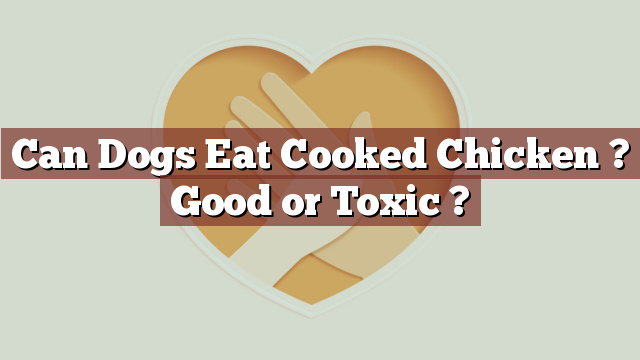Can Dogs Eat Cooked Chicken? Good or Toxic?
Knowing what foods are safe for our furry friends is essential for their health and well-being. One common question that many dog owners have is whether cooked chicken is a suitable addition to their pet’s diet. In this article, we will explore the nutritional value of cooked chicken for dogs, discuss its safety, potential risks and benefits, and provide guidance on what to do if your dog consumes cooked chicken.
Nutritional Value of Cooked Chicken for Dogs
Cooked chicken is a great source of protein for dogs. It contains essential amino acids that help maintain and repair their muscles and tissues. Additionally, chicken is rich in vitamins and minerals such as vitamin B6, vitamin B12, iron, and zinc, which contribute to a dog’s overall health. These nutrients are crucial for maintaining a strong immune system, supporting healthy digestion, and promoting optimal growth and development.
Is Cooked Chicken Safe or Toxic for Dogs?
Yes, dogs can safely eat cooked chicken. However, there are a few important considerations to keep in mind. First, it is crucial to remove all bones from the chicken before feeding it to your dog. Cooked chicken bones can splinter and pose a choking hazard or lead to intestinal blockage. Secondly, make sure the chicken is thoroughly cooked, as raw or undercooked chicken may contain harmful bacteria like Salmonella or Campylobacter.
It’s worth noting that while cooked chicken is safe for dogs, certain seasonings and ingredients commonly used in human cooking can be harmful to them. Avoid adding salt, garlic, onion, or any spices to the chicken, as these can be toxic to dogs. Stick to plain, unseasoned cooked chicken for your pet.
Potential Risks and Benefits of Feeding Dogs Cooked Chicken
Feeding your dog cooked chicken in moderation can offer several benefits. As mentioned earlier, it is an excellent source of protein, which is essential for muscle maintenance and growth. Furthermore, chicken is a lean meat option that can help dogs maintain a healthy weight and prevent obesity-related issues.
However, it is important to be mindful of portion sizes when feeding cooked chicken to your dog. Too much chicken in their diet can lead to an imbalance in their overall nutrition. It is always wise to consult with your veterinarian to determine the appropriate amount of cooked chicken to include in your pet’s diet.
What to Do If Your Dog Eats Cooked Chicken
If your dog accidentally consumes cooked chicken bones or exhibits any signs of distress after eating chicken, it is crucial to take immediate action. Contact your veterinarian for guidance on what steps to take. They may recommend monitoring your dog closely for any signs of discomfort, or in severe cases, they may advise bringing your dog in for an examination.
Conclusion: Cooked Chicken Can Be Safe and Beneficial for Dogs
In conclusion, cooked chicken can be a safe and beneficial addition to your dog’s diet. It provides valuable nutrients, such as protein, vitamins, and minerals, that support their overall health. However, it is important to ensure the chicken is boneless, thoroughly cooked, and unseasoned. Remember, moderation is key, and always consult with your veterinarian to determine the best diet plan for your furry friend. By following these guidelines, you can safely incorporate cooked chicken into your dog’s meals and provide them with a nutritious and delicious treat.
Thank you for investing your time in exploring [page_title] on Can-Eat.org. Our goal is to provide readers like you with thorough and reliable information about various dietary topics. Each article, including [page_title], stems from diligent research and a passion for understanding the nuances of our food choices. We believe that knowledge is a vital step towards making informed and healthy decisions. However, while "[page_title]" sheds light on its specific topic, it's crucial to remember that everyone's body reacts differently to foods and dietary changes. What might be beneficial for one person could have different effects on another. Before you consider integrating suggestions or insights from "[page_title]" into your diet, it's always wise to consult with a nutritionist or healthcare professional. Their specialized knowledge ensures that you're making choices best suited to your individual health needs. As you navigate [page_title], be mindful of potential allergies, intolerances, or unique dietary requirements you may have. No singular article can capture the vast diversity of human health, and individualized guidance is invaluable. The content provided in [page_title] serves as a general guide. It is not, by any means, a substitute for personalized medical or nutritional advice. Your health should always be the top priority, and professional guidance is the best path forward. In your journey towards a balanced and nutritious lifestyle, we hope that [page_title] serves as a helpful stepping stone. Remember, informed decisions lead to healthier outcomes. Thank you for trusting Can-Eat.org. Continue exploring, learning, and prioritizing your health. Cheers to a well-informed and healthier future!

